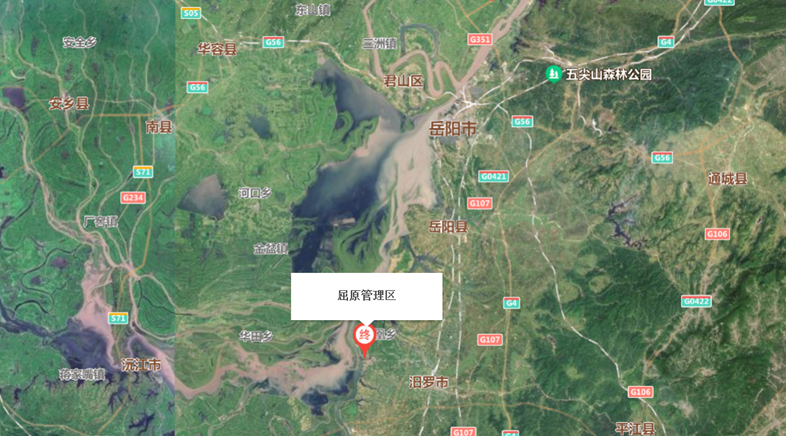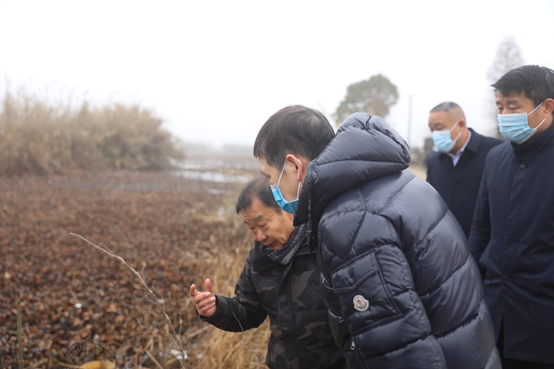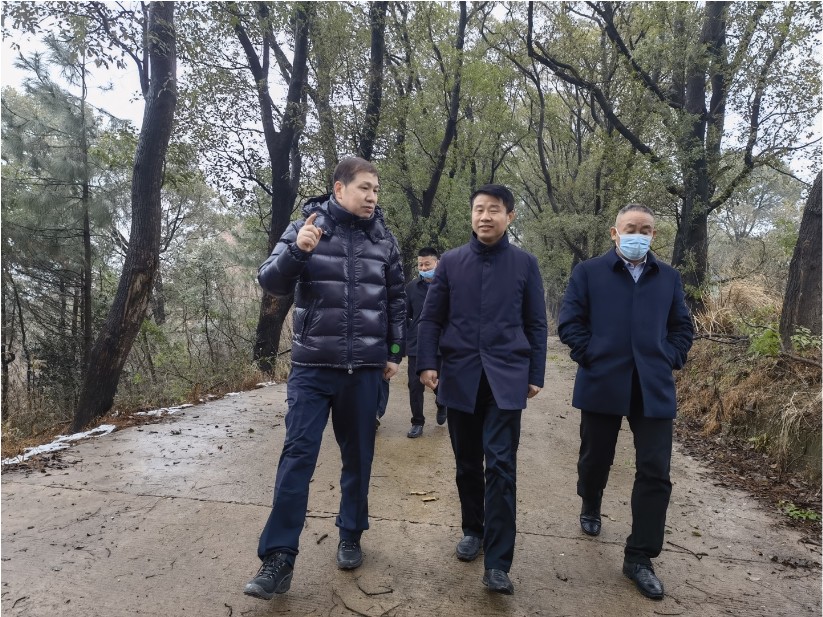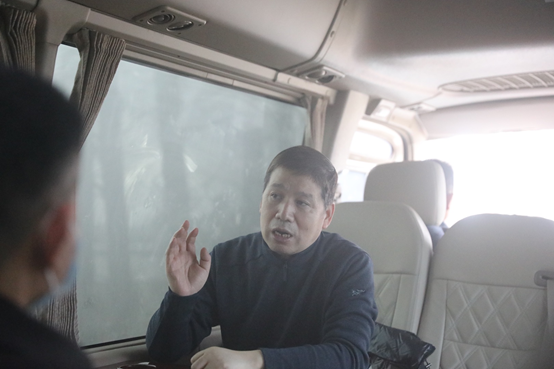Quyuan District is a sub-municipal area neighboring three rivers in the Yangtze River Basin in China. Over the past years, its environment has been improved significantly and a lot of birds have been visiting the wetlands-rich place. With rich biodiversity, the district is seeking specialized advice to its long-term strategic planning.
On a recent field survey in the Quyuan District, Yueyang, Hunan Province (湖南省岳阳市屈原管理区) on Feb. 9th 2022, Dr. Zhou Jinfeng, Secretary-General of China Biodiversity Conservation and Green Development Foundation (CBCGDF), highlighted some innovative biodiversity mainstreaming strategies as follows.

Location of Quyuan District, Human Province. Source: Baidu Map
It’s suggested that we establish a new CCAfa - a Community Conservation Area of Donggu Lake at Quyuan District (named after the great patriotic poet Qu Yuan living in the latter part of Chinese Warring States Period (476 BC - 221 BC) who threw himself into the river), and take the opportunity of RAMSAR COP14 to be held in 2022 in Wuhan, Hubei, to make it a world-class city featuring its unique small micro-wetlands with a great potential and Quyuan Culture in spite of the fact that it has a population of only 100,000 (people) and an area of just over 218 square kilometers.

Over the years, China has attached great importance to the construction of ecological civilization and biodiversity conservation, from concept to practice, which has been carried out nationwide. In the publicly released 2015 Millennium Development Goals China’s Progress by the Chinese government, the only unfulfilled target was Target 7B: Reduce biodiversity loss, achieving, by 2010, a significant reduction in the rate of loss. Countries all over the world, in order to achieve this target, have prioritized the conservation of endangered species, especially in government-established national protected areas. While in our opinion, the current efforts fall behind the necessity of conserving our nature. That’s why I proposed to carry out Biodiversity Conservation in Our Neighborhood (BCON), and nature conservation with people’s participation (“Human-based Solutions (HbS)” for nature conservation), which are of much more significance for post-2020 global biodiversity goals.
I have proposed two new concepts. A few days ago, our Deputy Secretary-General Linda Wong attended an event at invitation hosted by UNEP on which she presented two of my ideas, which were eventually incorporated into the current international document. One is “Human-based Solutions” (HbS), an internationally unprecedented idea advanced by me, featuring bottom-up approach through ALL people’s participation in nature & biodiversity conservation. Another one is the “Biodiversity Conservation in Our Neighborhood” (BCON), characterized by ALL conservation in our daily life, not only in Protected Areas, serving as an important approach for nature and for OECMs.
We expect to make Quyuan District a pilot for BCON.

A previous success was the Cangqiang Neighborhood’s practice. People in Cangqian Street, Hangzhou, Zhejiang Province, have made a great example by practicing BCON. All people are mobilized to conserve the nature around their homes, and to contribute to a sustainable human-nature harmonious co-existence. We know that the effectiveness of conservation efforts in nature reserves/protected areas at all levels is very limited. A vivid example is that birds (especially migratory birds) actually do not know which is a reserve and where a PA’s boundary sits , and will stay where they think fit for stopover. If we don't take care of them, they may become extinct or lose their populations in the future due to habitat loss and other factors. Should nature conservation be done only in nature reserves (areas specifically designated by the government), or should it be done where people live and carry out production activities as well? It will be a big adjustment for people's current production and life style when taking nature and biodiversity conservation into account. And I believe this will be popular worldwide in the near future, since the long-established area-based nature conservation system, with various reserves/protected areas as its core, has proved unable to curb the global trend of rapid loss of biodiversity or to stop the Sixth Mass Extinction in its tracks.
It would be the world-largest “Reserve for advancing BCON”, with an area of over 200 square kilometers in Quyuan District. The unprecedented idea was once against by the United Nations and its experts when I just proposed it years ago, while it’s proved effective and has now been accepted and recognized by them as an important type of OECMs for biodiversity conservation.
Biodiversity conservation needs innovative approaches. Professor Li Zhenwen’s showcases of small and micro-sized wetlands “lotus ponds” in Wuhan, Hubei, offering an important breeding habitat for the threatened wader species, perfectly embody BCON concept, and have been a great showcase to international conservation community. Likewise, we can also make the BCON story in Quyuan District world famous.
“Biodiversity in Our ‘Neighborhood’” actually highlights the importance of the conservation of non-protected areas for nature conservation. It’s expected that there will be financial support for BCON in the future.
Before May this year, we are going to apply to China’s Ministry of Education to organize a national competition on ecological civilization for primary and secondary schools. Such activities can well promote the participation of young children in ecological conservation.
It’s suggested by our foreign friends that we host an innovative nature watching event in addition to the mere bird-watching events. Birds are usually flagship species of our ecosystem, and the conservation of the whole ecosystem is even more important.

Nature-watching can be very crucial for the conservation.
The fact that we humans are now interfering with nature excessively like God is our biggest problem today. Instead of protecting the endangered species like giant pandas or other good-looking flagship endangered species, we should cherish our habitats more, which is quite different from just protecting some endangered species, and even surprised our friend from Oxford University.
I always like to raise different opinions. Ecological civilization is about the restoration of nature (恢复自然), not “Repair(修复)”. The so-called “repair of ecology”, which is very popular and has become a mainstreamed ‘fashion’ in China today, is totally wrong, since "repair" is still too much emphasis on human intervention in the natural ecosystem, through a variety of physical/chemical/biological means to repair nature, but in essence, it is still a kind of human intervention. Restoring nature, on the other hand, refers to a corresponding increase in biodiversity habitats. There will be microorganisms, worms, fish and shrimps… in the natural habitats increased, thus attracting birds, and the whole ecosystem will be rebuilt and restored. Therefore, what we’re supposed to do is to restore nature, to watch nature, to appreciate nature and live in harmony with nature.
It would be great if Quyuan District could embrace and practice these independent and innovative ideas and build them into a real model for the world to learn and to follow. We can do something new in addition to what we’ve done now.
We also have “civilization sites”. Speaking of civilization sites, do you know how we built the first one? It was in Changsha. Our Deputy Secretary-General, who is from Changsha, went back to her hometown and saw an old bookstore. She called me and told me that it was an old bookstore, the place where she read books when she was a child, and it is still there, and it has been over 30 years. The owner Lao Liu has been recycling old books for resale, which greatly contributed not only to our resources recycling, but also to cultivating affordable reading atmosphere to ordinary people for over 3 decades. We thought it was precious in terms of civilizational inheritance, and later granted a license “Eco-Site ” as a demo. As a result, many people read our reports and came to visit the Eco-site, and the bookstore becomes famous and now many people come to visit the Changsha-based bookstore all around China. We also would like to support the establishment of a number of eco-sites in Quyuan District, to promote the circular economy by any means of environmental friendly practice. Joint efforts can be made by establishing a series of such eco-sites, ecological civilization demonstration schools, CCAfas, BCON system.
Ecological civilization originates from biological nature and also from life, essentially it is still among the process (a stage) of historical development of human civilization. There are 7 levels of civilization where spitting is the lowest level, protecting environment the middle level, while for the current ecological civilization, which is the dominant/guiding human civilization, we should make a comprehensive adjustment in our way of consumption and production as well as our lifestyles in time to adapt to this new civilization era.
Thank you all!
(This article is based on the narrator's oral presentation and has not been verified.)
Original Chinese Article:
http://www.cbcgdf.org/NewsShow/5054/19048.html
Translator: Samantha
Editor: Linda
Contact the editors: V10@cbcgdf.org ; +8617319454776

Contribution
Do you know? CBCGDF is a non-profit organization. We rely on crowd-funding and donations. You have the opportunity to help us to advance biodiversity conservation. Donate TODAY to power up the movement to make it a better world for all life.
https://www.paypal.me/CBCGDFChina
http://www.cbcgdf.org/English/ConfirmDonaTion/0.html
